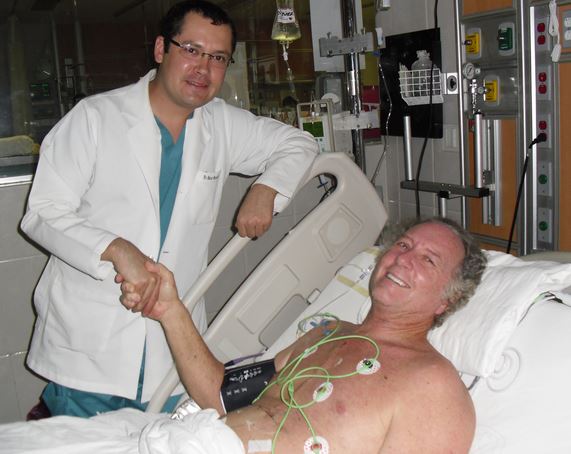May 20th, 2015 by Dr. Val Jones in Health Tips, True Stories
1 Comment »
 Like most physicians, I feel extremely rushed during the course of my work day. And every day I am tempted to cut corners to get my documentation done. The “if you didn’t document it, it didn’t happen” mantra has been beaten into us, and we have become enslaved to the quantitative. It’s tempting to rush through physical exams, assuming that if there’s anything “really bad” going on with the patient, some lab test or imaging study will eventually uncover it. Just swoop in, listen to the anterior chest wall, ask if there’s any new pain, and dash off to the next hospital bed. Then we construct a 5-page progress note in the EMR, describing the encounter, our assessment, and plan of care.
Like most physicians, I feel extremely rushed during the course of my work day. And every day I am tempted to cut corners to get my documentation done. The “if you didn’t document it, it didn’t happen” mantra has been beaten into us, and we have become enslaved to the quantitative. It’s tempting to rush through physical exams, assuming that if there’s anything “really bad” going on with the patient, some lab test or imaging study will eventually uncover it. Just swoop in, listen to the anterior chest wall, ask if there’s any new pain, and dash off to the next hospital bed. Then we construct a 5-page progress note in the EMR, describing the encounter, our assessment, and plan of care.
Focused physical exams have their place in follow up care, but I strongly urge us all to reconsider skimping on our exams. A fine-toothed comb should be used in any first-time meeting – because so much can be missed as we scurry about. Some examples of things I discovered during careful examination:
1. A pulsatile abdominal mass in a woman being worked up for dizziness.
2. New slurred speech in an edentulous gentleman with poorly controlled hypertension.
3. A stump abscess in a 2-year-old leg amputation.
4. A bullet lodged in the scrotum.
5. Countless stage 1 sacral decubitus and heel ulcers.
6. Melanoma.
7. Rashes that were bothering the patient for years but had not previously been addressed and cured.
8. Early cellulitis from IV site.
9. Deep venous thrombosis of the calf.
10. New onset atrial fibrillation.
11. Thrush.
12. Cataracts.
13. Peripheral neuropathies of various kinds.
14. Lateral medullary syndrome.
15. Surgical scars of all stripes – indicating previous pathology and missing organs of varying importance.
16. Normal pressure hydrocephalus in a patient who had been operated on for spinal stenosis/scoliosis.
17. Parkinson’s Disease in a patient with a fractured hip.
18. Shingles in a person with eye pain.
19. Aortic stenosis in a woman with dizziness.
20. Pleural effusions in a man complaining of anxiety.
Oftentimes I don’t find anything new and exciting that is not already a part of the patient’s medical record. But a curious thing happened to me the other day that made me reflect on the importance of the physical exam. After a careful review of a complex patient’s history, I discussed every scar and “abnormality” I discovered as I did a thorough head-to-toe review of his physical presentation. His aging body revealed more than he had remembered to say… and as our exam drew to a close, he reached out and offered me a fist-bump.
It was charming and unexpected – but made me realize the true importance of the thorough exam. I had gotten to know him in the process, I had earned his trust, and we had built the kind of therapeutic relationship upon which good healthcare is based. No EMR documentation effort was worth missing out on this interaction.
You may not uncover a new diagnosis on each physical exam, but you can gain something just as important. The confidence and respect of the patient.
September 15th, 2014 by Dr. Val Jones in Opinion
2 Comments »
 Judging from recent articles, surveys, and blog posts, the medical profession is remarkably demoralized. Typical complaints range from “feeling like a beaten dog” to “living in humiliating servitude,” to being forced to practice “treadmill medicine.” Interestingly, the public response to these complaints is largely indifferent. The prevailing attitude (if the “comments sections” of online articles and blog posts are representative) seems to be unsympathetic: “Poor doctors, making a little less income and not being treated like gods anymore? You have to do extra paperwork? You have to work long hours? Welcome to the real world, you whiners!”
Judging from recent articles, surveys, and blog posts, the medical profession is remarkably demoralized. Typical complaints range from “feeling like a beaten dog” to “living in humiliating servitude,” to being forced to practice “treadmill medicine.” Interestingly, the public response to these complaints is largely indifferent. The prevailing attitude (if the “comments sections” of online articles and blog posts are representative) seems to be unsympathetic: “Poor doctors, making a little less income and not being treated like gods anymore? You have to do extra paperwork? You have to work long hours? Welcome to the real world, you whiners!”
But thank goodness that practicing medicine is more nuanced than the Facebook stream of hostility that we are subjected to on a daily basis. If patients spoke to me the way online comments read, I’d surely have quit medicine years ago. But my reality is that patients are generally grateful, attentive, and respectful. This could be because I work in inpatient rehabilitation medicine, a place where patients are screened for motivation to participate in their care, but I don’t think that’s the whole story. I have experience working in other settings across the country (including Emergency Departments), and I have found a significant number of good-natured, engaged patients there too.
I think that to some degree our attitudes shape our work environments. Patient and peer dispositions are in part a reflection of our own. Try approaching a frightened, sick patient with an arrogant, dismissive tone and see how your professional relationship with them (and their families) develops. There is a negative cascade that physicians can trigger (perhaps unwittingly) when they are rushed, curt, or inattentive. Beginning every new patient relationship with a caring, respectful, detailed history and physical exam lays a foundation of trust for future interactions. Once you have established that positive rapport, the daily grind (along with what my friend, Dr. Steve Simmons, has nicknamed ‘C.R.A.P.P.’ – Continuous Restrictive And Punitive Paperwork) is much more bearable.
As physicians we have the power to make our careers as meaningful or soul-sucking as we choose. Reducing the C.R.A.P.P. in our work lives can help (I’ve tried outpatient, “concierge style” practices and inpatient locum tenens assignments with good success), but that’s not the most important factor in enhancing work satisfaction. The relationships built by allying ourselves with patients, and shepherding them through this broken system, are where the rewards lie. They hold the keys to our professional fulfillment because nothing can beat the joy of helping those in need.
How do I know that patient appreciation is enough to make medicine worthwhile?
Because I still don’t hate being a doctor.
June 27th, 2012 by Dr. Val Jones in Health Tips, Opinion, Research
1 Comment »
 One would think that happiness and healing are inextricably linked in healthcare, but the Happy Hospitalist (HH) raises an interesting question: is modern medicine’s emphasis on patient satisfaction (and shared decision-making) sacrificing our quality of care? A recent study found that patients who preferred their physicians to take the lead in their medical decision-making had shorter, less costly hospital stays.
One would think that happiness and healing are inextricably linked in healthcare, but the Happy Hospitalist (HH) raises an interesting question: is modern medicine’s emphasis on patient satisfaction (and shared decision-making) sacrificing our quality of care? A recent study found that patients who preferred their physicians to take the lead in their medical decision-making had shorter, less costly hospital stays.
HH argues that if physicians are expected to perform like airline pilots, reliably choosing/performing the best course of action for those depending on them, then patients should behave like passengers. In other words, passengers don’t tell the pilot how to fly the plane, nor should patients override a physician’s clinical judgment with personal preferences.
I think this analogy misses the mark because patients are rarely interested in making decisions about how a physician accomplishes her task, but rather which tasks she undertakes. Flight passengers aren’t interested in quibbling about the timing of landing gear, they are interested in the selection of their destination city. And so they should be.
While there may be a correlation between physician-led decision-making and shorter hospital stays, I’m not convinced that this translates to improved care quality. For the study subjects, discharge could have been delayed because the “empowered” patients insisted on ensuring that a home care plan was in place before they left the hospital. Or perhaps they wanted to get their prescriptions filled before going home (knowing that they couldn’t get to their home pharmacy over the weekend)? The study did not assess whether or not the discharge delays reduced readmission rates, nor did it seek to determine the cause of prolonged stays. This study alone is insufficient to draw any conclusions about the relative value of the patient empowerment movement on health outcomes.
While I certainly empathize with HH about the excessive focus on patient satisfaction surveys over true quality care, I strongly believe that an educated, participatory patient is our best ally in the practice of good medicine. There are simply too many cogs and wheels turning at once in the healthcare system to be able to ensure that the right care is provided at the right time, every time. We need all the help we can get to monitor our care plans in order to avoid medical errors, compliance problems and missed opportunities.
If you see something, say something. That principle applies to healthcare as much as it does to flight safety.
January 6th, 2012 by Toni Brayer, M.D. in Research
1 Comment »

 It’s time for some good news! A study that looked at online patient ratings about their physicians from 2004 through 2010 showed that the average physician rating was 9.3 out of 10. That is amazingly high and shows that patients (at least the ones who posted on Dr.Score) are very content with the care they receive from their doctor. Even though some patients will post a nasty comment about the doctor, the overall patient satisfaction is high. Seventy percent of doctors earned a perfect 10.
It’s time for some good news! A study that looked at online patient ratings about their physicians from 2004 through 2010 showed that the average physician rating was 9.3 out of 10. That is amazingly high and shows that patients (at least the ones who posted on Dr.Score) are very content with the care they receive from their doctor. Even though some patients will post a nasty comment about the doctor, the overall patient satisfaction is high. Seventy percent of doctors earned a perfect 10.
The survey asked patients to Read more »
*This blog post was originally published at EverythingHealth*
November 20th, 2011 by RyanDuBosar in Research
No Comments »

Adults who received care from a medical home in 11 Westernized countries were less likely to report medical errors and were happier with their care, according to a new Commonwealth Fund international survey.
The 2011 survey included more than 18,000 ill adults in Australia, Canada, France, Germany, the Netherlands, New Zealand, Norway, Sweden, Switzerland, the United Kingdom, and the United States. It included people who reported they were in fair or poor health, had surgery or had been hospitalized in the past two years, or had received care for a serious or chronic illness, injury or disability in the past year. The vast majority had seen multiple physicians.
A medical home was defined as patients reporting a regular source of care that knows their medical history, is accessible and helps coordinate care received from other providers. Results were published in Health Affairs.
Sicker adults in the U.S. were the most likely to Read more »
*This blog post was originally published at ACP Internist*
 Like most physicians, I feel extremely rushed during the course of my work day. And every day I am tempted to cut corners to get my documentation done. The “if you didn’t document it, it didn’t happen” mantra has been beaten into us, and we have become enslaved to the quantitative. It’s tempting to rush through physical exams, assuming that if there’s anything “really bad” going on with the patient, some lab test or imaging study will eventually uncover it. Just swoop in, listen to the anterior chest wall, ask if there’s any new pain, and dash off to the next hospital bed. Then we construct a 5-page progress note in the EMR, describing the encounter, our assessment, and plan of care.
Like most physicians, I feel extremely rushed during the course of my work day. And every day I am tempted to cut corners to get my documentation done. The “if you didn’t document it, it didn’t happen” mantra has been beaten into us, and we have become enslaved to the quantitative. It’s tempting to rush through physical exams, assuming that if there’s anything “really bad” going on with the patient, some lab test or imaging study will eventually uncover it. Just swoop in, listen to the anterior chest wall, ask if there’s any new pain, and dash off to the next hospital bed. Then we construct a 5-page progress note in the EMR, describing the encounter, our assessment, and plan of care.

 Judging from recent
Judging from recent  One would think that happiness and healing are inextricably linked in healthcare, but the
One would think that happiness and healing are inextricably linked in healthcare, but the 










